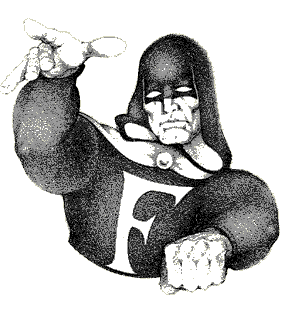


Lord Horace Neighbour works as British attaché at the British Embassy in Washington during the day, and fights crime at night as the caped crusader, Fantax. His enemies include the Mikado, the Gentleman Ghost, the Werewolf, the Cobra and many more. Fantax also fought against the Ku-Klux-Klan, the Mafia (led by Al Capy), the Nazis and various secret societies like the Black Tigers. Like the early Batman stories, Fantax’ adventures owed more than a passing debt to the American pulps like The Shadow, The Spider and The Avenger.
The Stories
Fantax chez les Gangsters (Fantax vs. The Gangsters) serialized in Paris-Monde Illustré No. 26 to 47 (1946). from "Fantax" Magazine
from "Reportages Sensationnels" Writer: Chott from "Fantax" Magazine
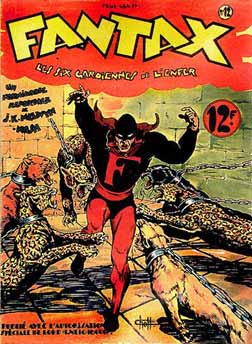 Fantax Magazine (1st Series):
Fantax Magazine (1st Series):
Wri: J. K. Melwyn-Nash (Marcel Navarro); Art: Chott.
1. Le Gentleman Fantôme (The Gentleman Ghost) (1946)
2. L'Ombre qui Tue (The Killing Shadow)
a.k.a. Fantax contre le Mikado (Fantax vs. The Mikado) (1946)
3. La Lutte contre Al Capy (The Battle against Al Capy)
a.k.a. Fantax chez les Gangsters (Fantax vs. The Gangsters) (1946)
4. Fantax contre l'Homme qui Terrorisait New York (Fantax vs. The Man Who Terrified
New York) (1946)
5. Fantax contre le "Werewolf" (Fantax vs. The Werewolf) (1946)
6. Les Pirates de l'Edelweiss (The Pirates of the Edelweiss) (1946)
7. La Torture du Corbeau (The Torture of the Raven) (1946)
8. Le Vautour de la Jungle (The Vulture of the Jungle) (1947)
9. Le Gang de la Mort (The Gang of Death) (1947)
10. Fusillade à Brooklyn (Gunfight in Brooklyn) (1947)
11. La Mort Noire (The Black Death) (1947)
12. Les Six Gardiennes de l'Enfer (The Six She-Guardians of Hell) (1947)
13. Fantax contre le Ku-Klux-Klan (Fantax vs. KKK) (1947)
14. La Maison des 7 Géants (The House of the 7 Giants) (1947)
Wri: J. K. Melwyn-Nash; Art: Robert Rocca.
15. Le Monde du Silence (The Silent World) (1947)
16. La Prêtresse du Soleil (The Priestess of the Sun) (1947)
17. Les Écumeurs de Londres (The Reavers of London) (1947)
18. Le Château de l'Épouvante (The Castle of Terror) (1947)
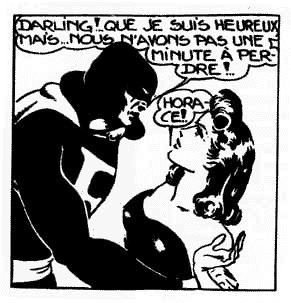 Wri: J. K. Melwyn-Nash; Art: Chott.
Wri: J. K. Melwyn-Nash; Art: Chott.
19. Le Désert de la Peur (The Desert of Fear) (1947)
20. Terre de Feu (Land of Fire) (1947)
Wri: J. K. Melwyn-Nash; Art: Robert Rocca.
21. Les Buveurs de Sang (The Blood Drinkers) (1947)
22. La Jungle en Délire (The Mad Jungle) (1947)
23. Les Tigres Noirs (The Black Tigers) (1947)
24. La Rose du Levant (The Rose of Sunrise) (1947)
25. Coupeurs de Têtes (The Head Shrinkers) (1947)
26. La Tour de la Faim (The Tower of Hunger) (1948)
Wri: J. K. Melwyn-Nash; Art: Robert Rocca.
27. Dans le Grand Silence Blanc (In the Great White Silence) (1948)
28. La Proie du Monstre (The Monster's Prey) (1948)
Wri: J. K. Melwyn-Nash; Art: Robert Rocca.
29. Sous le Signe du Cobra (The Mark of the Cobra) (1948)
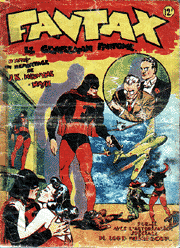 Wri: Chott; Art: Robert Rocca.
Wri: Chott; Art: Robert Rocca.
30. Évadés de l'Enfer (Escape From Hell)
(1948)
Wri/Art: Chott.
31. Le Spectre de la Mine (The Spectre of the Mine) (1948)
32. Le Monstre de l'Abîme (The Monster from the Abyss) (1948)
33. L'Atoll Mystérieux (The Mysterious Atoll) (1948)
34. Le Jockey Sans Nom (The Nameless Jockey) (1948)
Wri: Chott; Art: Robert Rocca.
35. Le Bolide Noir (The Black Racer) (1948)
36. La Piste Tragique (The Tragic Trail)
(1949)
37. Échec à Banserman (Banserman in Check) (1949)
Wri/Art: Chott.
38. Le Retour d'Al Capy (The Return of Al Capy) (1949)
39. Fantax Joue... et Perd! (Fantax Plays... And Loses!) (1949)
Serialized novel credited to "J-F. Ronald-Wills" (SF writer Max-André Dazergues)
La Perle de Manille [The Pearl Of Manila]
(Nos. 1-6, 1949)
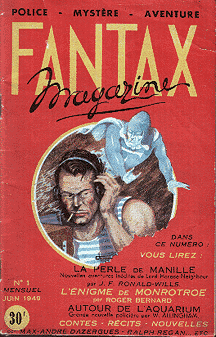
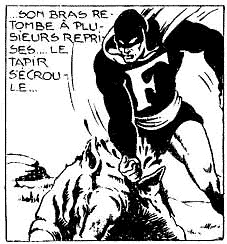
[Sensational Newsreports]
Artist: Remy
Bordelet
Les Nouvelles Aventures de Lord Horace Neighbour [The New Adventures Of Lord
Horace Neighbour]
(Nos. 1-5, 1950-51)
1. L'Homme Noir Prend la Main (The Dark
Man Returns) (1959)
2-3. L'Ange Noir (The Dark Angel) (1959)
3-4, 6. L'Enfer Blanc (The White Hell) (1959)
5. (reprints of Nos. 9, 10, 38 and 39 of First Series)
7-8. Fantax contre les Tigres Noirs (Fantax vs. The Black Tigers) (redrawn version of No.23 of First Series) (1959)
9. (reprint of Les Nouvelles Aventures de Lord Horace Neighbour (The New Adventures
of Lord Horace Neighbour) from Reportages
Sensationnels, with 3 new pages to complete the story.)
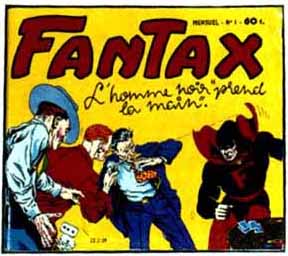
ALSO SEE "BLACK BOY"
FOR THE ADVENTURES OF THE SON OF FANTAX
Publishing History Because of its violent contents, including S&M scenes, bondage, torture, etc.,
mild by today’s standards but deemed rather prurient at the time, Fantax quickly drew the wrath of conservative and Christian organizations. It is no exaggeration
to say that Fantax was single-handedly
responsible for the adoption of the Law of July 1949 which thereafter heavily censored adventure comics. After drawing children's adventure strips during World War II, Pierre Mouchot (photo right) founded his own publishing company
in 1945, and created one of the first French costumed heroes, Fantax. Drawn by Mouchot,
who used the pseudonym of “Chott”, and
written by Marcel Navarro, who used the
American- sounding pseudonym of “J. K. Melwyn-Nash”,
Fantax was the first full-fledged super-hero
in the history of French comics. Recurring problems with French censorship ultimately drove Mouchot out of the comics business entirely. He
passed away in 1966.
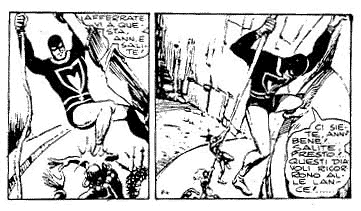
MASKAR
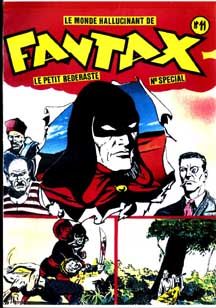
Thirty-nine issues of the original Fantax
were published between 1946 to 1949. Eight new stories were released in 1959, written by Mouchot and drawn by Rémy
Bordelet. A Fantax collection, Fantax est de Retour
[Fantax Returns], was reprinted
in the graphic novel format by Bedesup
in 1986.
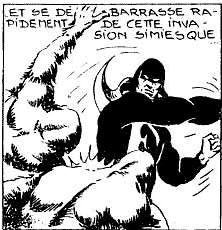
Because of its success, a rather blatant imitation of Fantax was published in Italy under the name of Maskar. This is rather ironic since Fantax
was himself heavily inspired by DC Comics' Hourman.
The Authors
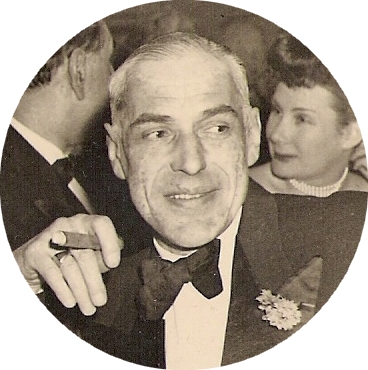
The portrait of Fantax at the top of this page is an homage drawn in 1996 by Bob
Roc for Gerard Thomassian.